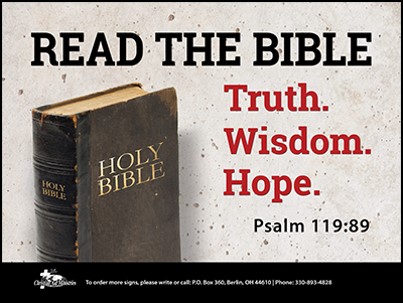The will of God is sovereign. After God removed the
Babylonian potentate Nebuchadnezzar from power for seven
years and then reinstated him, he acknowledged the
preponderant will of God: “All the inhabitants of the earth are
reputed as nothing; He does according to His will in the army of
heaven and among the inhabitants of the earth. No one can
restrain His hand or say to Him, ‘What have You done?’” (Daniel
4:35).
Yet, amazingly, people can reject the will of God: “But the
Pharisees and lawyers rejected the will of God for themselves, not
having been baptized by him” (Luke 7:30). John the Baptist was a
prophet of God. When these religious leaders rejected John’s
message, they rejected the will of God for themselves.
Although ultimately, the will of God prevails, God grants
man a limited field of operation in which he has freedom to make
personal choices.
An example of this is Paul’s journey to Rome. For some time
he had wanted to go to Rome. In his letter he explains: “Now I do
not want you to be unaware, brethren, that I often planned to
come to you (but was hindered until now)” (Romans 1:13). He
writes: “Without ceasing I make mention of you always in my
prayers, making request if, by some means, now at last I may
find a way in the will of God to come to you” (Romans 1:9, 10).
This shows great insight and a commendable attitude: “If I
may find a way in the will of God.” Paul understands that his
plans and actions are subject to the will of God, that he can
operate only within the limits God has set. As it turns out, he
does indeed travel to Rome - all expenses paid - as a prisoner of
the Romans!
Man’s prescribed area of choice might be compared to a
fence within which a small child is allowed to play. Without the
fence it would be unsafe. Inside the fence he can go where he
pleases and do what he wants. Even so, his mother keeps an eye
on him in case he comes up with something that exceeds the
wishes of his parents!
Jesus says: “It is not the will of your Father who is in heaven
that one of these little ones should perish” (Matthew 18:14). Why
then do people perish? Not because it is the will of God, but
because man’s inherent freedom enables him to make wrong
choices with bad consequences for himself and for others.
Leading up to this, Jesus had said: “Woe to the world
because of offenses! For offenses must come, but woe to that
man by whom the offense comes!” (Matthew 18:6, 7).
One person’s wrong choices can tempt someone else to sin
and be lost. But ‘offenses must come’. Why? Because this is
inherent in man’s power to choose.
Paul deals with the objection: “Why does He still find fault?
For who has resisted His will?” (Romans 9:19). Some try to blame
God for their own bad choices! Although the will of God prevails in
the end, people are responsible for the choices God allows them
to make and for the consequences.
Any parent of teenagers understands this. There comes a
time when parents must allow their children to make choices on
their own. As they assume greater freedom of choice, they also
assume responsibility for their choices and the consequences.
Just because the parents allowed a choice to be made, does not
make them responsible for the choice or its consequences.
One teenager protested: “Why didn’t God make man so he
could only choose what is right?” This is a dishonest cop-out.
What teenager wants to have his God-given freedom of choice
curtailed in any way? He likes this gift that God has given him!
God created people with the ability to choose to love Him or
to reject Him. The love of those who freely choose to love Him
more than offsets the grief caused by those who choose to reject
His will.
As Paul explains: “You will say to me then, ‘Why does He still
find fault? For who has resisted His will?’ But indeed, O man, who
are you to reply against God? Will the thing formed say to him
who formed it, ‘Why have you made me like this?’ Does not the
potter have power over the clay, from the same lump to make
one vessel for honor and another for dishonor? What if God,
wanting to show His wrath and to make His power known,
endured with much longsuffering the vessels of wrath prepared
for destruction, and that He might make known the riches of His
glory on the vessels of mercy, which He had prepared beforehand
for glory?” (Romans 9:19-23).
People are lost because they choose to reject the will of God.
Even so, God still enables them to be saved if they repent and
accept the gift of grace He offers through the sacrifice of His Son:
“The Lord is not slack concerning His promise, as some count
slackness, but is longsuffering toward us, not willing that any
should perish but that all should come to repentance” (2 Peter
3:9).
To allow man freedom of choice, God cannot prevent people
from being lost. But He has done everything possible to enable
the lost to be saved by sending His Son: “the Son of Man has
come to save that which was lost” (Matthew 18:11).
Jesus came to do the will of the Father.
“Jesus said to them, ‘My food is to do the will of Him who
sent Me, and to finish His work’” (John 4:34). “For I have come
down from heaven, not to do My own will, but the will of Him who
sent Me” (John 6:38).
“I can of Myself do nothing. As I hear, I judge; and My
judgment is righteous, because I do not seek My own will but the
will of the Father who sent Me” (John 5:30).
It was the will of the Father that Jesus should offer His body
as a sacrifice for sin: “Then I said, ‘Behold, I have come - In the
volume of the book it is written of Me - to do Your will, O God’”
(Hebrews 10:7).
The sacrifices of the Old Covenant were not sufficient as
atonement for sin: “‘Sacrifice and offering, burnt offerings, and
offerings for sin You did not desire, nor had pleasure in them’
(which are offered according to the law), then He said, ‘Behold, I
have come to do Your will, O God’” (Hebrews 10:8, 9).
By the will of God, Christ came to be a sacrifice for sin.
“By that will we have been sanctified through the offering of
the body of Jesus Christ once for all” (Hebrews 10:10).
Paul wrote to the churches of Galatia: “Grace to you and
peace from God the Father and our Lord Jesus Christ, who gave
Himself for our sins, that He might deliver us from this present
evil age, according to the will of our God and Father, to whom be
glory forever and ever” (Galatians 1:3-5).
It is the will of God that they who believe in Christ might
receive mercy, salvation and eternal life.
Jesus explained: “This is the will of the Father who sent Me,
that of all He has given Me I should lose nothing, but should raise
it up at the last day. And this is the will of Him who sent Me, that
everyone who sees the Son and believes in Him may have
everlasting life; and I will raise him up at the last day” (John
6:39, 40).
God wants us to be sanctified.
When charging the Thessalonians to abstain from sexual
immorality, Paul states: “For this is the will of God, your
sanctification” (1 Thessalonians 4:3). God wants us to be holy.
To realize this sanctification we must be born again by the
will of God. “But as many as received Him, to them He gave the
right to become children of God, to those who believe in His
name: who were born, not of blood, nor of the will of the flesh,
nor of the will of man, but of God” (John 1:12, 13). “Of His own
will He brought us forth by the word of truth, that we might be a
kind of firstfruits of His creatures” (James 1:18).
Our inclusion in the family of God is also called an adoption
by the will of God: “Blessed be the God and Father of our Lord
Jesus Christ, who has blessed us with every spiritual blessing in
the heavenly places in Christ, just as He chose us in Him before
the foundation of the world, that we should be holy and without
blame before Him in love, having predestined us to adoption as
sons by Jesus Christ to Himself, according to the good pleasure of
His will, to the praise of the glory of His grace, by which He made
us accepted in the Beloved” (Ephesians 1:3-6).
In Christ, God has “made known to us the mystery of His
will, according to His good pleasure which He purposed in
Himself, that in the dispensation of the fullness of the times He
might gather together in one all things in Christ, both which are
in heaven and which are on earth” (Ephesians 1:9, 10).
As adopted sons we have an inheritance: “In Him also we
have obtained an inheritance, being predestined according to the
purpose of Him who works all things according to the counsel of
His will” (Ephesians 1:11).
We must do God’s will to be in the family of God.
Jesus said: “For whoever does the will of My Father in
heaven is My brother and sister and mother” (Matthew 12:50 //
Mark 3:35).
Jesus warned: “Not everyone who says to Me, ‘Lord, Lord,’
shall enter the kingdom of heaven, but he who does the will of My
Father in heaven” (Matthew 7:21).
Have you ever wanted to put to silence the ignorance of
foolish men? God wants us to do this and tells us how: “For this is
the will of God, that by doing good you may put to silence the
ignorance of foolish men” (1 Peter 2:15).
Until the end we must continue to do the will of God: “For
you have need of endurance, so that after you have done the will
of God, you may receive the promise” (Hebrews 10:36).
“The world is passing away, and the lust of it; but he who
does the will of God abides forever” (1 John 2:17).
The letter to the Hebrews closes with this beautiful
benediction: “Now may the God of peace who brought up our
Lord Jesus from the dead, that great Shepherd of the sheep,
through the blood of the everlasting covenant, make you
complete in every good work to do His will, working in you what
is well pleasing in His sight, through Jesus Christ, to whom be
glory forever and ever” (Hebrews 13:20, 21).
To do God’s will, we must know God’s will.
The Scriptures reveal the will of God. David wrote: “I delight
to do Your will, O my God, and Your law is within my heart”
(Psalm 40:8). “All Scripture is given by inspiration of God, and is
profitable for doctrine, for reproof, for correction, for instruction in
righteousness, that the man of God may be complete, thoroughly
equipped for every good work” (2 Timothy 3:16, 17).
The will of God must be learned. David prayed: “Teach me
to do Your will, for You are my God; Your Spirit is good. Lead me
in the land of uprightness” (Psalm 143:10).
Jesus states a prerequisite for knowing the will of God: “If
anyone wills to do His will, he shall know concerning the doctrine,
whether it is from God or whether I speak on My own authority”
(John 7:17). One must first want to do God’s will to recognize
which doctrine is from God.
One must then conform to the will of God to really
experience the will of God: “And do not be conformed to this
world, but be transformed by the renewing of your mind, that you
may prove what is that good and acceptable and perfect will of
God” (Romans 12:2).
Having heard of the faith and love of the Christians at
Colosse, Paul writes: “For this reason we also, since the day we
heard it, do not cease to pray for you, and to ask that you may
be filled with the knowledge of His will in all wisdom and spiritual
understanding” (Colossians 1:9).
“Therefore do not be unwise, but understand what the will of
the Lord is” (Ephesians 5:17).
What have we learned from the Scriptures about the will of
God?
The universe exists by the sovereign will of God. Although
ultimately, the will of God prevails, God grants man a limited field
of operation in which he has freedom to make choices. People can
reject the will of God and are responsible for the consequences.
People perish, not because it is the will of God, but because
man’s inherent freedom enables him to make wrong choices with
bad consequences for himself and for others.
Jesus came to do the will of the Father by being a sacrifice
for sin.
It is the will of God that they who believe in Christ receive
mercy, salvation and eternal life, that they be sanctified through
a spiritual rebirth and become sons of God by adoption.
In the family of God we must continue to do the will of God
until the end to receive the promise of eternal life.
To do the will of God, we must know the will of God from the
Scriptures. We must want to do the will of God to recognize His
will and we must actually do His will to experience His will.
“Therefore do not be unwise, but understand what the will of
the Lord is” (Ephesians 5:17).
Roy Davison










